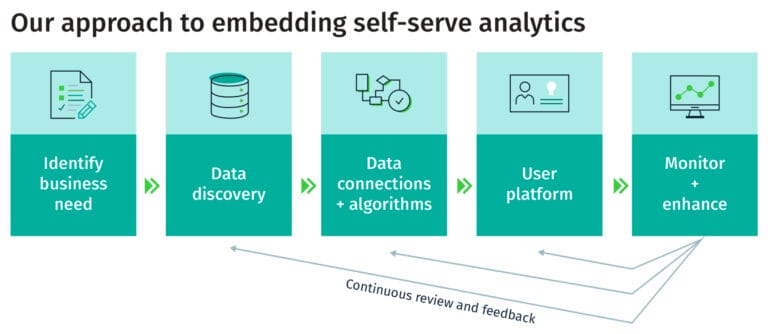
Data analytics has become a buzzword in today’s digital age, but does it require math? Well, let’s find out!
In the world of data analytics, numbers are at the heart of everything. But fear not, you don’t need to be a math genius to excel in this field!
Data analytics is like detective work, where you use data to uncover valuable insights and solve real-world problems. So, let’s dive in and explore the role of math in data analytics!
Does Data Analytics Require Math?
Data analytics does require math, but don’t let that scare you away. While a solid foundation in math is helpful, you don’t need to be a math genius to excel in data analytics. The key is to have a basic understanding of concepts like statistics, probability, and algebra.
There are many tools and software available that can perform complex calculations for you, allowing you to focus more on interpreting and analyzing the data. So, while math is a part of data analytics, it’s not the only skill you need to succeed.
Role of Math in Data Analytics
Mathematics and data analytics are closely intertwined. Data analytics involves collecting, organizing, analyzing, and interpreting large sets of data to extract meaningful insights and make informed decisions. Math provides the foundation for many of the techniques used in data analytics.
Statistical analysis, probability, calculus, linear algebra, and optimization methods are just a few examples of the mathematical concepts applied in data analytics.
An understanding of statistics is particularly crucial in data analytics. Statistical analysis helps data analysts make sense of the data by examining patterns, correlations, and trends. It allows them to identify outliers, estimate probabilities, and make predictions. Additionally, linear algebra plays a significant role in data analytics, as it is used to analyze relationships between variables and create models that represent the data.
Overall, math provides the tools and techniques needed to extract valuable insights from data. It enables data analysts to uncover patterns, detect anomalies, and make data-driven decisions that can drive business growth and innovation.
Benefits of Having Strong Math Skills in Data Analytics
Honing your math skills can greatly benefit you in the field of data analytics. Here are some specific advantages:
- Enhanced Analytical Abilities: A solid understanding of math equips you with the ability to think analytically and approach complex problems systematically. This skill is indispensable in data analytics, where you need to examine data from multiple angles and draw accurate conclusions.
- Advanced Modelling and Forecasting: With a strong mathematical foundation, you can create sophisticated models that accurately represent complex data sets. These models can be used for forecasting future trends, predicting customer behavior, or optimizing business processes.
- Improved Decision Making: Math helps you make informed decisions by objectively analyzing data. By applying mathematical concepts, you can identify key insights, evaluate different scenarios, and select the best course of action based on data-driven evidence.
- Innovation and Optimization: Math can drive innovation by identifying areas for improvement and optimizing processes for efficiency. By analyzing data mathematically, you can uncover hidden patterns and devise innovative solutions that lead to business growth.
Common Mathematical Concepts Used in Data Analytics
Data analytics employs various mathematical concepts to extract insights from data. Here are a few commonly used concepts:
- Statistics: Statistics provides techniques for summarizing and interpreting data, such as measures of central tendency, hypothesis testing, and regression analysis. These techniques help analysts identify patterns, correlations, and trends.
- Probability: Probability is used to estimate the likelihood of events occurring based on available data. It is essential for making predictions and calculating uncertainties in data analytics.
- Calculus: Calculus plays a role in data analytics by providing methods for optimization. It helps analysts find maximum or minimum values that optimize a particular objective.
- Linear Algebra: Linear algebra facilitates the analysis of relationships between variables and the creation of mathematical models that represent the data. It helps with tasks such as dimensionality reduction and clustering.
These are just a few examples of the mathematical concepts used in data analytics. A deeper understanding of these concepts empowers data analysts to unlock the full potential of the available data, leading to more accurate insights and better decision-making.
Does Data Analytics Require Advanced Math Skills?
While having a strong foundation in math is undoubtedly beneficial for data analytics, it’s important to note that not every aspect of data analytics requires advanced math skills. The level of mathematical complexity can vary depending on the specific role and tasks involved.
Many basic data analytics tasks can be accomplished using fundamental mathematical concepts, such as basic statistics and arithmetic. Tools and software with user-friendly interfaces have also made it easier to perform analyses without extensive mathematical knowledge.
However, having advanced math skills can open up more opportunities and allow you to tackle complex problems more effectively. It can enable you to develop more advanced models, optimize processes to a greater extent, and handle sophisticated statistical analyses.
Math plays a crucial role in data analytics. It provides the foundation for many of the techniques used to analyze and extract valuable insights from data.
While basic math skills are essential, having a strong mathematical foundation can enhance your analytical abilities, enable advanced modeling and forecasting, improve decision-making, and drive innovation and optimization.
While not every aspect of data analytics requires advanced math skills, honing your mathematical knowledge will undoubtedly benefit you in navigating the complex world of data analytics.
Frequently Asked Questions
Curious about the role of math in data analytics? Here are some common questions and answers to help you understand if math is a requirement for data analytics.
1. How important is math in data analytics?
Math plays a vital role in data analytics, but it’s not the only skill that matters. Understanding mathematical concepts, such as statistics, probability, and algebra, can help you interpret and analyze data effectively.
Math provides the foundation for many data analytics techniques, allowing you to make accurate predictions, identify patterns, and uncover insights.
However, it’s important to note that while math is necessary, you don’t need to be a math genius to excel in data analytics.
Many tools and software can handle complex calculations for you, leaving you to focus on interpreting and applying the results to real-world problems. So while math is important, it’s just one piece of the data analytics puzzle.
2. Can I be successful in data analytics without strong math skills?
Absolutely! While a solid understanding of math can be advantageous, data analytics isn’t solely about crunching numbers. It’s a multidisciplinary field that combines statistical analysis, programming, critical thinking, and domain knowledge.
So, even if you’re not a math whiz, you can still excel in data analytics by sharpening your skills in these areas.
Moreover, there are various tools and software available today that streamline the analytical process, minimizing the need for manual calculations. These tools allow you to focus on extracting meaningful insights from data, irrespective of your math proficiency.
So, while math skills can be beneficial, they’re not the sole determinant of success in data analytics.
3. Are there specific math concepts I should focus on for data analytics?
Yes, certain math concepts are particularly useful in data analytics. Understanding statistics, including measures of central tendency, hypothesis testing, and regression analysis, is crucial for interpreting and drawing accurate conclusions from data.
Probability theory is also important for making predictions and analyzing uncertain events.
Additionally, familiarity with linear algebra can help you understand how data is organized and manipulated in mathematical models. Concepts like matrix operations and eigenvalues can be helpful when dealing with large datasets and implementing machine learning algorithms. Having a firm grasp of these foundational math concepts can significantly enhance your data analytics skills.
4. Can I learn the necessary math skills for data analytics on my own?
Absolutely! You don’t need to enroll in an expensive degree program to acquire the required math skills for data analytics. There are numerous online resources, tutorials, and courses available that can help you learn math concepts relevant to data analytics.
Start by brushing up on basic statistics and probability theory. As you progress, explore more advanced topics like regression analysis and linear algebra. Additionally, practice is key.
Applying what you’ve learned to real-world data sets and problems will deepen your understanding of how math is applied in data analytics.
5. What if I struggle with math? Can I still pursue a career in data analytics?
Absolutely! Many successful data analysts have overcome initial struggles with math. Remember that data analytics is a multidimensional field that encompasses various skills beyond math alone. Focus on improving your strengths, such as programming, problem-solving, and critical thinking, while working on developing your math skills.
Also, don’t be afraid to seek help. Online communities, forums, and mentors can provide valuable guidance and support. Surrounding yourself with a supportive network will help you overcome challenges and grow as a data analyst. With dedication, persistence, and a growth mindset, you can definitely pursue and excel in a career in data analytics, regardless of your initial struggles with math.
Data analytics does not necessarily require advanced math skills. You can use data analytics tools and software that do the math for you. Even without math knowledge, you can still analyze data and draw meaningful insights.
However, having a basic understanding of math concepts can help you interpret and communicate your findings better. Learning math can be beneficial but is not a prerequisite for getting started in data analytics.
In conclusion, data analytics is accessible to everyone, regardless of math skills. With the right tools and a basic understanding of math, you can analyze data effectively and make informed decisions based on the insights you gain.
So don’t let math intimidate you, give data analytics a try and see the power of data in action!






